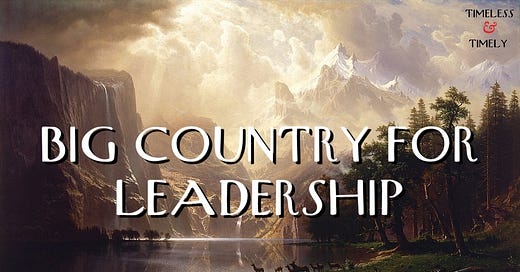
“And this our life, exempt from public haunt,
Finds tongues in trees, books in the running brooks,
Sermons in stones, and good in every thing.”
— William Shakespeare, 1599
We can find inspiration anywhere we look, if we keep the proper mindset.
Gratitude combined with curiosity — being a lifelong learner — is a formula that can set us up for success.
I usually pull stories from history or literature as guides for leadership and communication. In this case, I’m going to switch it up a bit.
Last week I came across a scene in the 1958 Academy Award-winning film The Big Country that gave me pause.
In this edition of Timeless & Timely, I’m going to take you through the scene and point out some key takeaways for leaders. And in a gutsy move, in the follow-up essay for premium subscribers, I analyzed the “Main Title” from the soundtrack by Jerome Moss as one befitting leaders.
You won’t want to miss that.
The Big Country is an epic Western directed by William Wyler (who also directed Ben Hur, Roman Holiday, The Best Years of Our Lives) and starring Gregory Peck, Jean Simmons, Burl Ives, Charlton Heston and Chuck Connors. It follows retired sea captain James McKay (Peck) who heads out west to meet up with his fiancée and her family, the Terrills.
The Terrills are ranchers have an ongoing feud with another family of ranchers, the Hannasseys.
(Incidentally, a recent issue of the newsletter, “Concession Stand,” concerned feuds.) Burl Ives plays Rufus, the clan’s father; Chuck Connors plays his hot-headed son Buck.
Between the two properties is an abandoned ranch house called “Big Muddy” which sits on land that includes the river that’s a source of water for both sets of cattle, particularly during times of drought. Julie Maragon (Simmons) owns the house and sells it to McKay, who agrees to continue her tradition of allowing both families’ cattle access to the river.
Meanwhile, Buck tries to persuade Rufus that he is planning to marry Julie. Buck brings her to the Hannessey’s, in hopes of persuading her to sell Big Muddy to him and get married, but Julie reveals that she sold it already, and Rufus realizes her interest is in McKay.
Because he knows the Major (head of the Terrill family) will attempt to rescue her, Buck takes Julie hostage, hoping to ambush him in the canyon leading to his homestead. Although McKay personally promises Rufus equal access to the water, he finds himself in a clash with Buck, which is ultimately settled with a duel—a duel with the very set of dueling pistols that McKay presented to the Major.
And here we pick up at the duel scene:
This scene is one of the reasons Burl Ives received an Oscar for Best Supporting Actor for this film. It’s a powerful demonstration of conflicting emotions.
Duels are based on a code of honor—typically honor that the challenger wishes to restore. Participants are expected to act with honor in carrying out the duel, and that also goes for the seconds, who act as representatives to the two parties.
In the case of the duel in The Big Country, Rufus acted as a neutral second for Buck and McKay, laying out the rules very plainly:
“If either man tries to beat the signal, it’s my duty to shoot him down like a dog, and I’ll do it. So help me. This thing’s gonna be done right and proper.”
Buck fires before the signal, but misses, his bullet grazing McKay’s forehead and leaving McKay with a free shot. As McKay prepares his shot, Buck responds in a craven and cowardly way, attempting to fire the pistol again and then cowering in fear as he hides behind a wagon wheel.
Rufus knows that the duel must be completed in the right and honorable way. We can see him struggling with his role and his underlying emotions, knowing that his son is a coward and violated the rules, as he insists McKay take his shot.
McKay, thoroughly disgusted by Buck’s behavior, fires his shot into the ground, thereby requiring Rufus to fulfill his prophecy. Seeing an opportunity to kill McKay, Buck snatches another gun from a nearby cowboy.
Rufus — Buck’s father — shoots him on the spot.
As Rufus approaches Buck, he varies between anger and anguish: anger over Buck’s repeated dishonorable actions, even after Rufus warned him. And anguish over having to shoot his own son, who then dies in his arms.
Leadership Lessons
Keep reading with a 7-day free trial
Subscribe to Timeless & Timely to keep reading this post and get 7 days of free access to the full post archives.






